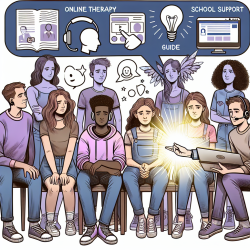The Rejection Sensitivity (RS) Model is a powerful framework that can significantly enhance our understanding of the mental health challenges faced by sexual minority adolescents. This model, as discussed in the research article "The Rejection Sensitivity Model: Sexual Minority Adolescents in Context," provides valuable insights into how rejection impacts mental health and behavior in LGBTQ youth. As practitioners working with this vulnerable population, it is crucial to integrate these insights into our practice to better support our students.
The Role of Rejection Sensitivity in Mental Health
Rejection sensitivity refers to the tendency to anxiously expect, readily perceive, and intensely react to rejection. For sexual minority adolescents, this sensitivity is often heightened due to societal stigma and discrimination. The RS model emphasizes that these adolescents not only expect rejection but also experience anxiety and fear associated with these expectations. This anxiety can lead to detrimental mental health outcomes such as depression and suicidality, which are prevalent among sexual minority youth.
Anxiety and Aggression: Different Faces of Rejection Sensitivity
The RS framework highlights that the emotional responses to anticipated rejection can vary. While anxiety is a common response, some adolescents may react with anger or aggression. Understanding these different emotional responses is crucial for tailoring interventions. For example, adolescents who respond with aggression may benefit from strategies that focus on anger management and community engagement, while those experiencing anxiety may require support focusing on reducing fear and building resilience.
Practical Strategies for Practitioners
- Create Safe Spaces: Schools should implement inclusive policies that foster a supportive environment for LGBTQ students. Safe spaces can mitigate the development of RS by providing acceptance and reducing experiences of rejection.
- Cognitive Behavioral Interventions: Techniques like Cognitive Behavioral Therapy (CBT) can help students manage anxiety related to rejection sensitivity by challenging negative thought patterns.
- Psychoeducation: Educate students about RS and its impact on their mental health. Understanding the process can empower them to develop coping strategies.
- Community Engagement: Encourage participation in Gender and Sexuality Alliances or other supportive groups that promote activism and resilience.
The Importance of Further Research
The RS model offers a promising avenue for understanding the mental health challenges faced by sexual minority adolescents. However, there is still much to learn about how different intersecting identities, such as race and gender identity, influence RS. Practitioners are encouraged to engage with ongoing research and contribute to studies that explore these intersections further.
The integration of the RS framework into practice not only aids in addressing current mental health challenges but also contributes to the development of more comprehensive support systems for sexual minority youth. By staying informed and actively participating in research endeavors, practitioners can play a pivotal role in advancing the well-being of these adolescents.
The Rejection Sensitivity Model: Sexual Minority Adolescents in Context










